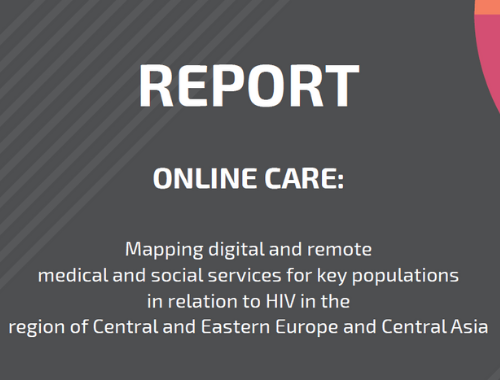COVID-19 has had an unprecedented impact on HIV prevention, treatment and support programmes for key populations in the countries of Central, Eastern Europe and Central Asia (CEECA). It has brought with it not only devastating threats, but also new opportunities for innovation and change. One such innovation has been the introduction of online or remote service delivery.
On 7 September 2021, the Eurasian Regional Consortium held an online discussion. More than 30 practitioners and experts from NGOs that provide HIV-related health and social services to key populations in Belarus, Estonia, Georgia, Kazakhstan, Kyrgyzstan, Lithuania, Moldova, Russia, Tajikistan and Ukraine together with representatives of technical agencies and specialists from state and municipal health services examined current challenges and priorities for promoting sustainable and quality digital and remote HIV services for key populations in CEECA.
The main objective of the meeting was to create a platform for discussion at regional level, involving practitioners and experts to examine key technical and expert support needs and identify next steps in promoting sustainable and quality digital and remote services for key populations in the countries of the region.
The research team consisting of Anna Tokar, Maria Samko and Marina Kornilova presented the methodology and results of the mapping of existing digital and remote HIV services for key populations in CEECA. A compendium describing best practices based on the mapping study was also shown. The presentation described key barriers, key needs and recommendations for promotion of services.
The results of the study once again confirmed that the transition from the traditional way of delivering services to an online format creates a number of new challenges and needs for both service providers and funders, such as public services and donor organisations. These needs include requirement for additional technical and financial resources, specialist staff skills, data recording, cybersecurity, protection of sensitive data and quality control.

ONLINE CARE: Mapping digital and remote medical and social services for key populations in relation to HIV in the region of Central and Eastern Europe and Central Asia.
The first part focuses on mapping existing practices of online and remote services, identifying the challenges and needs of service providers to effectively implement them

Best practices in the provision of digital and remote medical and social HIV services for key populations in the region of Central and Eastern Europe and Central Asia.
The second part describes the methodology of the most common services currently provided in the countries of the CEECA region.
Practical experiences of remote and online services were presented by organisations from Moldova, Russia and Ukraine. In their presentations, speakers paid special attention to how the process of service delivery was organised, what challenges they faced and how they overcame them, what results have already been achieved.
Nikolay Unguryan presented experience of ‘Humanitarian Action’ web-based outreach in the context of harm reduction and HIV prevention for people who use drugs in Saint-Petersburg, Russia.
Andrey Chernyshev presented experience of ALLIANCE.GLOBAL of rolling out remote services such as community-based HIV, STIs and viral hepatitis testing and counselling, HIV self-testing, provision of pre-exposure prophylaxis (PrEP) and national awareness campaigns in COVID-19 context in Ukraine.
Ruslan Poverga presented the Positive Initiative’s experience on distribution of prevention materials to key groups through pharmacies and vending machines, and approaches of registering online services in the national database: “RID” in Moldova.
The participants discussed the existing critical issues regarding the provision of online services in their respective countries and developed a list of key priorities for the next steps to be taken by the key stakeholders for successful promotion and development of quality digital and remote services in the following thematic areas:
Technical solutions and management systems
Limited technical resources, including the availability of modern PCs and tablets, constant access to high-speed mobile internet, were identified as priority issues that hampered the development of online services. Participants felt that investment in hardware should be focused on developing modern web interfaces, mobile applications and software that would facilitate the interaction between service provider and client, adviser workstations should be equipped to help ensure the privacy of both client and adviser, online service record keeping systems and client uniqueness should be automated and synchronised with other service providers, and client confidentiality should be ensured.
The need to address cyber-security issues (including the issue of security of personal data of clients and employees) was raised as a separate issue.
Among the priority issues that need to be addressed at both national and regional levels, participants mentioned the need to develop guidelines and standards for the provision of digital and remote services, which would be based on the existing evidence base, as well as standards and recommendations of key international organizations.
In the context of accounting, planning and cyber security of online services, experts participating in the meeting pointed out that most countries already have databases in which the personal data of online service customers are already stored and recorded on servers, but the problem is that these databases are not compatible with each other or are outdated, making it impossible to share or synchronise them. One technical solution would be to update and interoperate these databases, which would solve the issue of storing personal data on secure servers, record unique clients, plan services more correctly and avoid the need to create new costly databases. Where such databases do not exist in a country, the experience of other countries should be used and regional networks and initiatives could help by documenting evidence-based approaches, best practices, and sharing experiences between countries in this area.
Other priorities for technical solutions and management systems included costing of services, taking into account different approaches and needs of different key groups, as well as a flexible combination of offline and online services.
Monitoring and evaluation
Virtually all organisations record the provision of digital and remote services to some degree, but the lack of a single, generally accepted vision of what a digital and/or remote service is, where and when it begins/stops, including what components it comprises, leads to problems with customer record-keeping.
The lack of a common definition and understanding of a digital/remote service, as well as standards for its provision and a transparent and reliable system for recording digital services, makes it impossible to carry out meaningful quality control and to assess the effectiveness of digital services. For the most part, the quality of digital service delivery is assessed by customer feedback.
Participants highlighted the need to monitor online services separately from other consultations that are conducted offline, including on clients contacts and message recording. One challenging issue where investment and technical assistance is needed is in setting up costly online counselling systems in multiple languages (both national, English, French for migrants).
HIV services need to be integrated into the existing health counselling systems.
At the regional level there is need to develop recommendations or best practices on how to keep records management of digital and remote services and number of clients reached by such services. A client management system for online services should be an important priority for donor organisations and should be discussed openly with all stakeholders.
The role of regional networks and initiatives should be to document and promote best practices in logging and tracking of online services (e.g. terminal and online services tracking, use of online payment terminals, other innovative approaches), as well as to organize exchange of experiences between countries and technical assistance.
Capacity building, supervision and support for social workers providing online services.
The following key priority issues were voiced at the meeting:
- Lack of skills among staff;
- Difficulties in adapting staff to the online format;
- Difficulties with balancing work online and leisure, and, as a consequence, professional burnout;
The following needs were identified as priorities:
- New staff for organisations (e.g. IT specialist, website administrator, application administrator, chat/forum moderator, content manager/copywriter);
- new knowledge and skills in computer literacy, working with web-based communication platforms, social networks and messengers, knowledge and use of their functionality in work, online counselling, burnout prevention, cyberbullying prevention and data security
- skills in developing and implementing procedures and policies to ensure the protection of personal data and confidentiality of both client and service provider when delivering online services.
